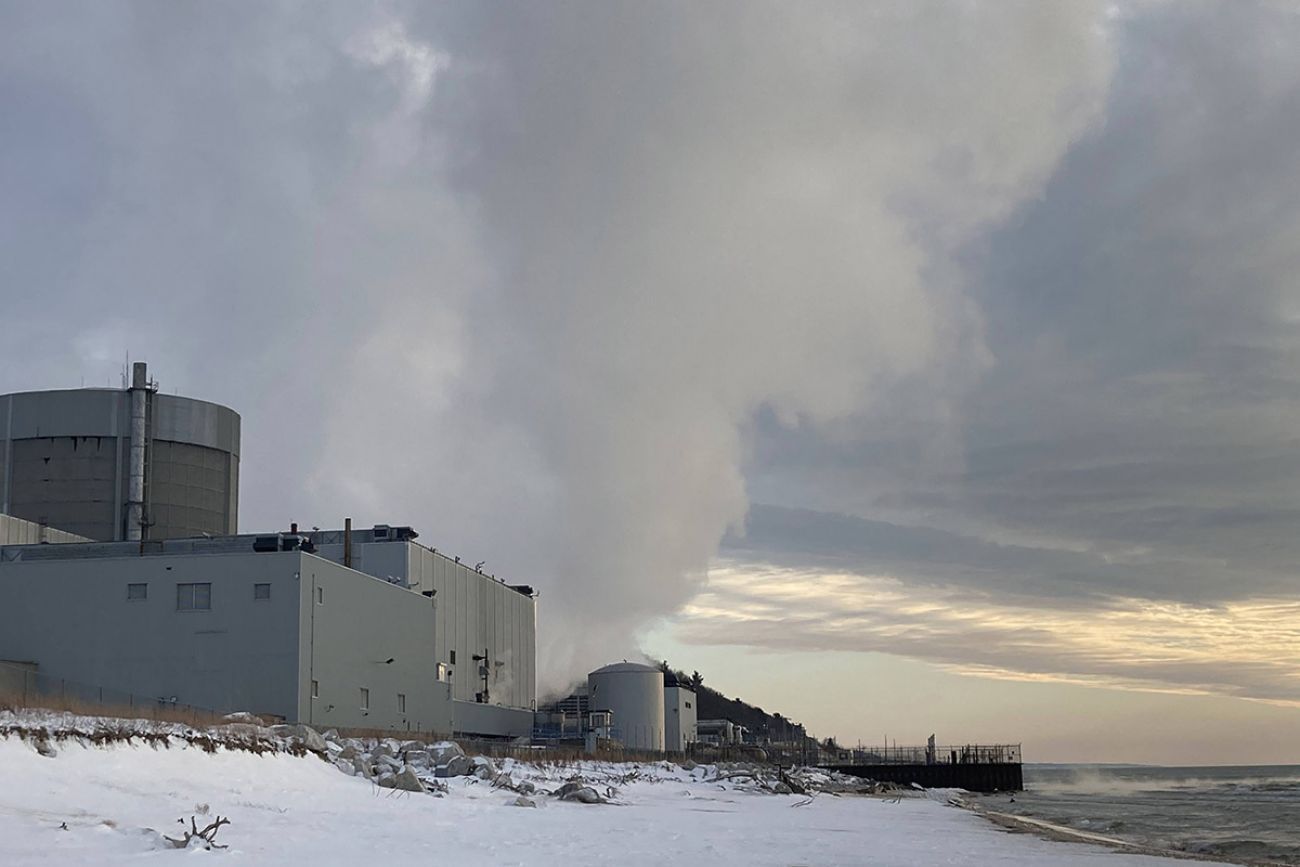Michigan company agrees to buy nuclear power from shuttered Palisades plant

- Wolverine Power Cooperative has agreed to buy power from the shuttered Palisades nuclear plant
- The plant’s owner still needs a loan and approval from the federal government in order to reopen
- Anti-nuclear advocates argue the plant should remain closed
The owner of the Palisades nuclear power plant has cleared a key hurdle in its quest to reopen the southwest Michigan facility: finding someone to buy the power.
Wolverine Power Cooperative, a nonprofit rural energy cooperative based in Cadillac, has agreed to buy up to two-thirds of power produced over a roughly 28-year period at the 800-megawatt plant along the Lake Michigan shoreline in Van Buren County.
A second cooperative, Hoosier Energy, serving customers in Indiana and Illinois, will purchase the rest.
Related:
- Michigan lawmakers pledge ‘full support’ for reopening Palisades nuclear plant
- Fresh off Palisades closure, Michigan will study state’s nuclear prospects
- Gretchen Whitmer: Federal grant could keep open Palisades nuclear plant
- Nuclear power is having a moment in Michigan after Palisades
That puts Palisades, which is owned by Holtec International and closed in May 2022, closer to a potential restart that supporters say is crucial to Michigan’s efforts to meet a carbon-neutral future.
Eric Baker, president and CEO of Wolverine, declined to discuss specifics of the agreement Tuesday, but said power drawn from Palisades would be cost-competitive with solar.
“The future of Michigan's electric reliability, in my opinion, is in jeopardy if this plant is not restarted,” Baker told Bridge Michigan in an interview.
Baker noted that Michigan is already a net-importer of energy and is expected to lose power-generation capacity as coal plants go offline.
Opponents of the effort argue that restarting Palisades is not the right way to go about decarbonizing Michigan, citing concerns about the 51-year-old plant’s age and safety. Kevin Kamps, radioactive waste specialist at Beyond Nuclear, said those concerns have only grown in the 16-months since the plant shut down.
“You can't just shut a reactor and then flip a switch and turn it back on,” Kamps said, adding that he fears old and unused equipment may have begun to degrade.
But Kamps sees the widespread political support for the plant as an indicator that little can be done to stop a reopening. U.S. Energy Secretary and former Michigan governor Jennifer Granholm, current Gov. Gretchen Whitmer and a host of politicians on both sides of the aisle have expressed support for a restart.
“The fix is in,” Kamps said.
In a statement, Kelly Trice, President of Holtec Nuclear Generation and Decommissioning, vowed that re-starting Palisades “will soon be a reality."
“The repowering of Palisades ensures Michigan has sufficient energy to meet future demand and mitigate the impact of climate change, while creating hundreds of high-paying Michigan jobs, expanding the local tax base, and unleashing economic opportunity within the region and beyond,” Trice said.
The agreement also gives Wolverine certain rights tied to Holtec’s longer-term plan to install small modular reactors at the Palisades site. Holtec hopes to build two 300-megawatt reactors in addition to the existing plant, which would add capacity to power hundreds of thousands of additional homes.
Wolverine supplies power to communities across more than half of the lower peninsula, according to the company. The Palisades agreement would boost the cooperative’s ability to deliver carbon-free power, which already makes up 60 percent of its output. Nuclear is 41 percent of Wolverine’s total power mix, while the company also owns seven natural gas plants in Michigan.
But Holtec still has hurdles to clear before it could restart Palisades, from finding hundreds of workers to staff the plant, to getting financial support from the federal government.
The company has applied for a U.S. Department of Energy loan of about $1 billion. The federal application is still in process, while Michigan committed $150 million to the potential reopening in the state’s June budget.
If all other pieces fall into place, Holtec spokesperson Patrick O’Brien said the two-year process to reopen the plant could start this fall.
When it was fully operational, the plant employed 600 people in jobs averaging $117,000 annually, and was among the largest taxpayers in Van Buren County. There are now about 220 workers at the plant, O’Brien said, and the company would need to hire approximately 300 more to support a restart.
Wolverine’s members are seven smaller Michigan electric cooperatives:
Cherryland Electric Cooperative in Grawn, Great Lakes Energy in Boyne City; HomeWorks Tri-County Electric Cooperative in Portland; Midwest Energy & Communications in Cassopolis; Presque Isle Electric & Gas Co-op in Onaway; Spartan Renewable Energy in Cadillac; and Wolverine Power Marketing Cooperative in Cadillac.
Michigan Environment Watch
Michigan Environment Watch examines how public policy, industry, and other factors interact with the state’s trove of natural resources.
- See full coverage
- Subscribe
- Share tips and questions with Bridge environment reporter Kelly House
Michigan Environment Watch is made possible by generous financial support from:
Our generous Environment Watch underwriters encourage Bridge Michigan readers to also support civic journalism by becoming Bridge members. Please consider joining today.
See what new members are saying about why they donated to Bridge Michigan:
- “In order for this information to be accurate and unbiased it must be underwritten by its readers, not by special interests.” - Larry S.
- “Not many other media sources report on the topics Bridge does.” - Susan B.
- “Your journalism is outstanding and rare these days.” - Mark S.
If you want to ensure the future of nonpartisan, nonprofit Michigan journalism, please become a member today. You, too, will be asked why you donated and maybe we'll feature your quote next time!






